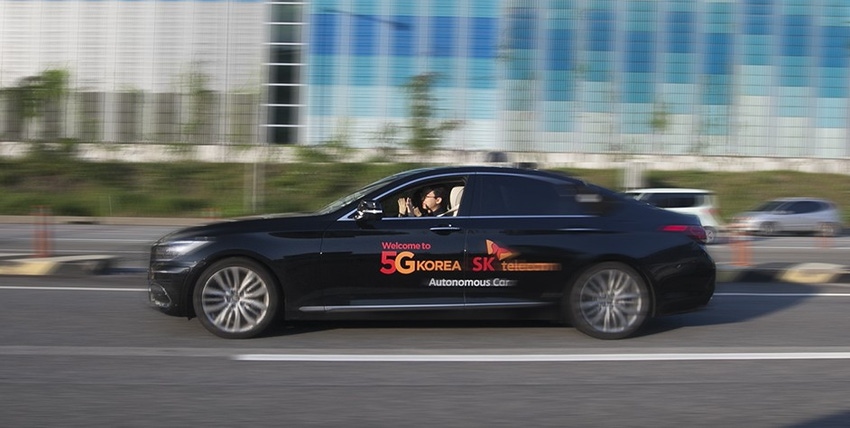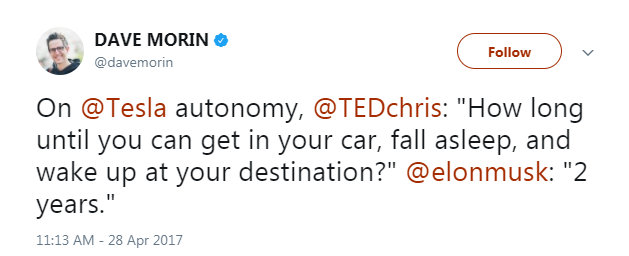How did SK Telecoms autonomous car get on with Korea’s busiest road, is Tesla hungry enough to design its own chips and how is Blackberry still a thing? All good questions raised this morning.
September 21, 2017

How did SK Telecoms autonomous car get on with Korea’s busiest road, is Tesla hungry enough to design its own chips and how is Blackberry still a thing? All good questions raised this morning.
Starting with SK Telecom, the team announced it has successfully tested its self-driving vehicle in public, and we’re not talking about some Asda car park where it only has to worry about teenagers learning to parallel park.
The vehicle demonstration took place on the Gyeongbu Expressway, the most heavily travelled road in Korea, from Seoul Service Area to Suwon-Shingal Interchange (26km) at speeds up to up to 80kmph. Teaming up with Seoul National University team, Nvidia and LG Electronics, the test is one of the biggest milestones since receiving a license from the Ministry of Land, Infrastructure and Transport in July.
“Following today’s successful test-driving of our autonomous vehicle on an expressway, we will continue to test our self-driving cars on downtown roads, national highways and motorways,” said Park Jin-hyo, Head of Network R&D Center of SK Telecom. “Furthermore, we will connect self-driving vehicles to our 5G trial networks to advance technologies that can significantly enhance driving safety via IoT and real-time communication with the control tower.”
Over in the world of Tesla, the team is pushing boundaries once again, this time venturing into the previously unknown world of AI chips.
Very few people will argue over the innovation which has come out of Elon Musk’s business, but taking a dip into the world of microprocessors is something which might have caught a few people by surprise. According to sources at CNBC, Musk and his minions are working with AMD to create its own chipset for autonomous driving.
Musk has previously promised customers he will deliver on the promise of self-driving cars by 2019, and creating his own AI chipset to manage the autonomous driving tasks would certainly make that promise a bit more of a reality.
Tesla has not commented on the developments to date, but it has been noted the company is attempted to reduce reliance on other technology companies for future tech. Perhaps it was burnt by the Mobileye snub last year and just isn’t ready to open itself up to love quite yet. It has been working with Nvidia since the split, but maybe Musk just isn’t feeling this relationship is as fulfilling as with Mobileye. Perhaps he quite likes the idea of a spinsters life.
Heading up the team is Jim Keller a well-respected microprocessor engineer, known for previous roles at AMD and Apple. Keller is reportedly leading a 50-strong team in the venture, including several former colleagues after a raid of AMD employees in recent months.

Finally, over to Blackberry. The Canadians have announced a partnership Delphi to provide the operating system for its autonomous driving system. This perhaps brings about one question; how is Blackberry still a thing.
The QNX operating system is certainly a well-respected name in the driving arena, but is there any need to maintain the Blackberry brand; is it actually adding any value? Most people associate the brand with a dated and clunky phone, more at home clipped onto the belt of an office supplies salesman than in-charge of an autonomous vehicle. Is this an association which anyone wants?
The partnership itself will see the pair work on software performance and safety in their operating system. Delphi’s autonomous driving system, Centralized Sensing Localization and Planning (CSLP), is set to launch in 2019, though the QNX safety OS will facilitate Delphi’s proprietary Ottomatika software algorithms and middleware, with the aim to enhance performance and safety.
“BlackBerry QNX will provide a robust software infrastructure for CSLP and help advance Delphi’s autonomous driving system,” said Glen De Vos, Delphi CTO. “Safety in high performance computing systems is paramount to a production ready autonomous driving solution.”
“There is no safety without security,” said John Wall, GM of BlackBerry QNX. “With cyberattacks and threats to connected vehicles on the rise, it is imperative that auto manufacturers are provided with software that is safety certified, reliable and secure. This is an area in which BlackBerry QNX excels, and we look forward to the new opportunities this expansion with Delphi will bring.”
It is an area which certainly needs to be addressed, but one which has been glossed over to date. Perhaps this is because it is not a pleasant topic, but how do you ensure autonomous vehicles cannot be weaponised by nefarious individuals sitting on a laptop miles away. QNX claims to bring the capabilities to guard the system against malfunctions, malware, and cyber-attacks by implementing a multi-level, policy-driven security model.
If Blackberry can prove QNX is an OS which can safeguard the autonomous vehicle from external hacks, might this be a way for Blackberry to muscle its way back into the supply chain? It certainly is becoming a forgotten brand, but tackling a question no-one else wants to address would be a good way to recapture relevance.
About the Author(s)
You May Also Like








.png?width=300&auto=webp&quality=80&disable=upscale)


_1.jpg?width=300&auto=webp&quality=80&disable=upscale)


.png?width=800&auto=webp&quality=80&disable=upscale)